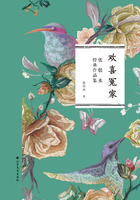"Sophisticated as I may appear"--it was her frequent phrase--she had found sympathy her best resource. It gave her plenty to do; it made her, as she also said, sit up. She had in her life two great holes to fill, and she described herself as dropping social scraps into them as she had known old ladies, in her early American time, drop morsels of silk into the baskets in which they collected the material for some eventual patchwork quilt. One of these gaps in Mrs. Assingham's completeness was her want of children; the other was her want of wealth. It was wonderful how little either, in the fulness of time, came to show; sympathy and curiosity could render their objects practically filial, just as an English husband who in his military years had "run" everything in his regiment could make economy blossom like the rose. Colonel Bob had, a few years after his marriage, left the army, which had clearly by that time done its laudable all for the enrichment of his personal experience, and he could thus give his whole time to the gardening in question. There reigned among the younger friends of this couple a legend, almost too venerable for historical criticism, that the marriage itself, the happiest of its class, dated from the far twilight of the age, a primitive period when such things--such things as (36) American girls accepted as "good enough"--had n't begun to be; so that the pleasant pair had been, as to the risk taken on either side, bold and original, honourably marked, for the evening of life, as discoverers of a kind of hymeneal Northwest Passage. Mrs. Assingham knew better, knew there had been no historic hour, from that of Pocahontas down, when some; young Englishman had n't precipitately believed and some American girl had n't, with a few more gradations, availed herself to the full of her incapacity to doubt; but she accepted resignedly the laurel of the founder, since she was in fact pretty well the doyenne, above ground, of her transplanted tribe, and since, above all, she HAD invented combinations, though she had n't invented Bob's own. It was he who had done that, absolutely puzzled it out by himself from its first odd glimmer--resting upon it moreover, through the years to come, as proof enough in him by itself of the higher cleverness. If she kept her own cleverness up it was largely that he should have full credit. There were moments in truth when she privately felt how little--striking out as he had done--he could have afforded that she should show the common limits. But Mrs. Assingham's cleverness was in truth tested when her present visitor at last said to her: "I don't think, you know, that you're treating me quite right. You've something on your mind that you don't tell me."
It was positive too that her smile of reply was a trifle dim. "Am I obliged to tell you everything I have on my mind?"
"It is n't a question of everything, but it's a question (37) of anything that may particularly concern me. Then you should n't keep it back. You know with what care I desire to proceed, taking everything into account and ****** no mistake that may possibly injure HER."
Mrs. Assingham, at this, had after an instant an odd interrogation.
"'Her'?"
"Her and him. Both our friends. Either Maggie or her father."
I HAVE something on my mind," Mrs. Assingham presently returned; "something has happened for which I had n't been prepared. But it is n't anything that properly concerns you."
The Prince, with immediate gaiety, threw back his head. "What do you mean by 'properly'? I somehow see volumes in it. It's the way people put a thing when they put it--well, wrong. I put things right. What is it that has happened for me?"
His hostess had the next moment drawn spirit from his tone. "Oh I shall be delighted if you'll take your share of it. Charlotte Stant's in London.
She has just been here."
"Miss Stant? Oh really?" The Prince expressed clear surprise--a transparency through which his eyes met his friend's with a certain hardness of concussion.
"She has arrived from America?" he then quickly asked.
"She appears to have arrived this noon--coming up from Southampton--at an hotel. She dropped upon me after luncheon and was here for more than an hour."
The young man heard with interest, though not (38) with an interest too great for his gaiety. "You think then I've a share in it? What IS my share?"
"Why any you like--the one you seemed just now eager to take. It was you yourself who insisted."
He looked at her on this with conscious inconsistency, and she could now see that he had changed colour. But he was always easy. "I did n't know then what the matter was."
"You did n't think it could be so bad?"
"Do you call it very bad?" the young man asked.
"Only," she smiled, "because that's the way it seems to affect YOU."
He hesitated, still with the trace of his quickened colour, still looking at her, still adjusting his manner. "But you allowed you were upset."
"To the extent--yes--of not having in the least looked for her. Any more," said Mrs. Assingham, "than I judge Maggie to have done."
The Prince thought; then as If glad to be able to say something very natural and true: "No--quite right. Maggie has n't looked for her. But I'm sure," he added, "she'll be delighted to see her."
"THAT certainly"--and his hostess spoke with a different shade of gravity.
"She'll be quite overjoyed," the Prince went on. "Has Miss Stant now gone to her?"
"She has gone back to her hotel, to bring her things here. I can't have her," said Mrs. Assingham, "alone at an hotel."
"No; I see."
"If she's here at all she must stay with me."
He quite took it in. "So she's coming now?"
(39) "I expect her at any moment. If you wait you'll see her."















